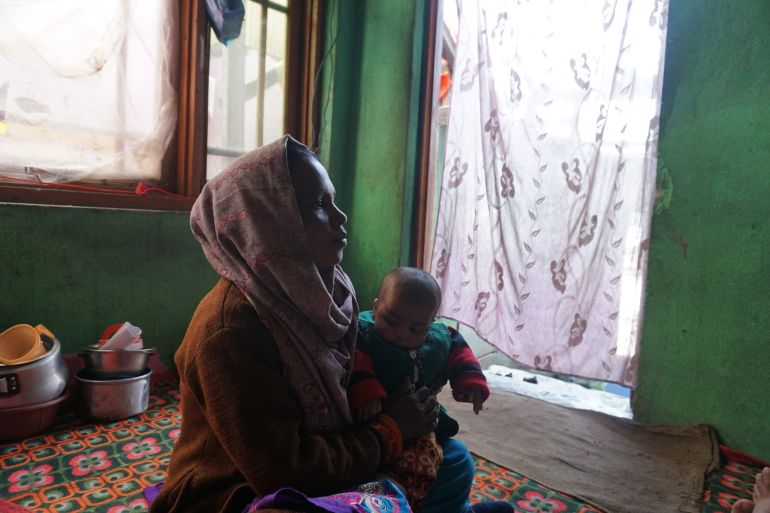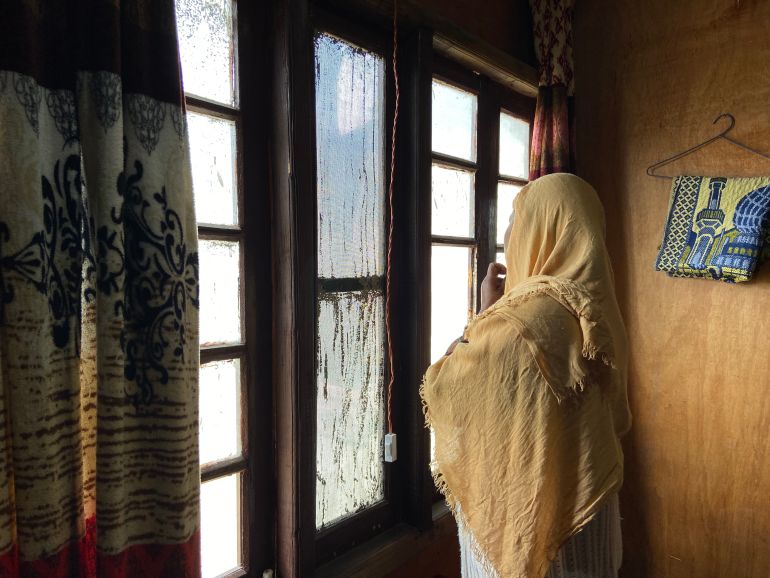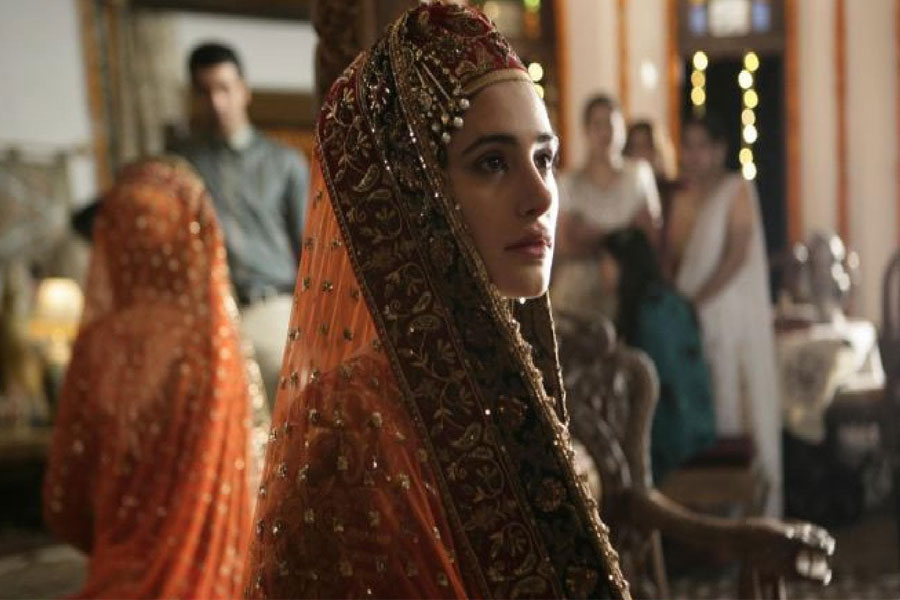*Names of the women and children have been changed to protect their identity.
Indian women are being sold in Kashmir for as little as $35 by traffickers for forced marriages against their free will.
One of these victims, a 29-year-old woman (Nazima Begum), accompanied by her youngest son just 5 months old, shared that she lives in a single room with her 3 children including a 7 and 10-year-old.
Her husband died from heart disease 4 months ago, and although she is still going through a tough time, she is trying to show herself as a stronger individual for her children.

Rifat Fareed/Al Jazeera
Nazima’s* marriage is unlike the ones we hear of, it was neither arranged nor love, it was a forced marriage. She had been kidnapped from her home in the state of West Bengal and transported 1,600km (1,000 miles) to Kashmir, where she was forced to marry a man 20 years her senior who had paid her traffickers $250 for a bride.
After his death, she was forced to look after the children on her own without any support. This is just one of the many stories AlJazeera had uncovered.
Quratulain Baloch Gets Justice After Brutal Murder by Husband
Nazima grew up in a poor family that was stricken by poverty, so when she heard that an NGO was looking to offer women and girls from poor backgrounds jobs in West Bengal’s capital, Kolkata by a friend in the village, she decided this might be her one chance to change their misfortune.
After arriving at the destination, she was offered tea and surrounded by a few men and women around her. Soon after having the drink, she was unable to speak and was led to a car by two men. It was all a scam – a setup by traffickers to mislead poor and helpless women into the trap.
“The men looked scary,” Nazima said. “I did not understand what was happening.” The traffickers handed her over to Kashmiri men. “We were all terrified,” she says. “We could not do anything as we were frightened that we might be harmed.”
Hungry and tired, the women were put in a cab and driven through treacherous mountain passes and along unpaved roads in the dark.
In Jammu, I felt in a completely strange place, the language was completely different. It looked like a different world.
They were taken to the home of one of the traffickers, where they were made to change out of the clothes they had by now been wearing for days.
They were taken to the home of one of the traffickers, where they were made to change out of the clothes they had by now been wearing for days. The clothes they had given to her and the other girls who had been trafficked with her “were not very nice”.
“There was an old man who kept a hand on my head and I was introduced to my husband,” she says. “I was not able to understand what they were saying. There was an overwhelming fear in me.” Then the old man announced that she was married.
The man who bought her brought her back to the single room she currently lives in. He lived there with his 10-year-old son, from his first wife who had passed in an accident.
In those first weeks, she cried often. “The night was the most difficult time. I missed my people. I missed the food, the rice did not taste as it did at home. I felt like I belonged to nowhere.” She tried to escape many times, but would only get as far as the cab station before returning.
“I did not want to live here but I was not able to understand what to do,” she says. “The language was the biggest barrier. I was only able to speak Bengali.” Nazima says her husband treated her well. “He promised me that he would allow me to visit my home because he saw that I was miserable,” she says.
After many months, her husband took her to see her family, but not knowing where she was they thought she had been killed. Rejoiced to see their loved one, they were also left in major confusion as they didn’t know the man who accompanied her was her husband.
She desperately wanted to stay with her family but was already pregnant with her first child so reluctantly returned to Kashmir with her husband.
Her husband’s death has now led her to a state of stress and confusion as if she returns home, her family’s financial burdens will again increase and if she doesn’t the traffickers who sold her will find her and sell her again, this time maybe even sell her children.
The traffickers ruined my life. I cannot think of going back
‘
Whistleblower Alleges Top Baluchistan Hospital is Running a Prostitution Ring
The Stats
According to India’s National Crime Records Bureau (NCRB), there were more than 1,700 cases of human trafficking in 2020 – this includes adults and children trafficked into marriage, slavery and prostitution. However, AlJazeera (AJ) says that experts think this is just the tip of the iceberg and that the actual number and be much higher than expected.
“Trafficking is gravely underreported in India,” explains Tarushika Sarvesh, an assistant professor of sociology at the Aligarh Muslim University (AMU). “Sometimes the families of women and children who are recovered and brought back don’t want to acknowledge the fact that they were trafficked, as trafficking in popular perception is mostly understood as sexual exploitation,” she added.
Abdul Rashid Hanjura, a Kashmir-based lawyer told AJ that there is “a full-fledged business for the brokers involved in bride trafficking” in the region.
This happens because of poverty. Many poor men are not able to afford marriage in Kashmir because we have many expensive rituals in which an average marriage costs more than $1,000.” Trafficked brides – many of whom are underage – can cost as little as $80, he says.
Sometimes, they are sold to the agents by their families. “I saw one case where the agents paid just $35 [to a family],” he adds.
Blame Game or Helplessness?
One of the middlemen the platform spoke to (he denied giving his name) shared that the cost of buying a bride ranges from $250 to $500 but denied that the women and girls were ‘forced’ into this business.
“Some families who are poor willingly send their daughters for marriage; they also charge some money. Some women willingly come and then don’t like it here and want to escape, then they blame others. But here they have food and everything, in their home states there is more poverty,” he insisted.
An Alternative Source for the Poor
Farooq Ahmad, a 45-year-old married a woman from Kolkata almost a decade ago. According to him, his family tried to find him a local girl but were unable to. He added that the expenses of marrying a local girl were so high as the groom as to pay the bride Haq Mehr and for the feast, a simple wedding would have cost him $1,500 whereas he could get one from elsewhere for just $300.
“We are poor,” he says, adding that more than a dozen men in his village have paid to marry women from other states. Farooq’s 30-year-old wife, Sabeena*, says she was lured to Kashmir with the promise of a good life, but that it never materialised.
“I was told the man has enough money and has apple orchards. But there is nothing,” she laments. “I experienced a lot of hardships.” Now Sabeena, Farooq and their 8 children live in a mud house that belonged to Farooq’s uncle before his death last year. “We have no one here, no parents, no siblings. Even if we are beaten we don’t have a parent’s home to go to,” Sabeena says. “The loneliness is most difficult.”
Arsheeda Jan* now 43 years old explained that her parents died when she was a child. She met a middle-aged Bengali woman who promised her a job in a shawl factory in Kashmir, Arsheeda saw an opportunity to earn some money. She was 13 years old.

Rifat Fareed/AlJazeera
“She told me that will provide me with a job in Kashmir and we have to do embroidery on shawls. I had no idea where Kashmir is,” Arsheeda recalls. When she reached Kashmir, the woman, who was herself married to a Kashmiri man, kept Arsheeda in her home for a week.
3 Female Pakistani PhD Holders Open Up About Online Harassment by Own Countrymen
“I kept on asking her ‘where is the job?’ Then one day a man and his father arrived with a bearded man who was supposed to do my nikah (marriage contract).”
When Arsheeda cried, the cleric explained that he could not marry her against her will and left. But the family found someone else who was willing to do it. “The agent threatened me that if I raise my voice she will kill me. I was very scared,” she says.
“When my husband entered my room for the first time, I was shivering. I tried to flee many times but failed. Then I became pregnant. I gave up on the idea that I can ever leave this life,” she says. “When there is a fight with my husband he asks me to leave and pay the money for which he bought me,” she says. “My husband beats me sometimes and he taunts me.”
She added that she tried to approach a shelter, but they were unwelcoming “[They] inform my husband,” she explains. “Some neighbours assume I have slept with many men, that’s how they think I landed here. They don’t understand …” “[They] inform my husband,” she explains. “Some neighbours assume I have slept with many men, that’s how they think I landed here. They don’t understand …”
“The hole in my heart will never heal,” she reflected.
The root cause of this problem must be addressed if we want to prevent more people from being affected by it. The government must ensure that everyone has access to proper education, healthcare and employment opportunities so they can live with dignity and freedom. Only then can we truly put an end to this harmful practice in Kashmir.
Share your two cents with us in the comments below.
Stay tuned to WOW360.
#JusticeForDayaBheel: How Much More Do Pakistani Women Have to Take?
